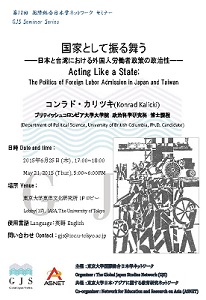以下の通り、第120回目のGJS主催、東文研・ASNET共催のセミナーを開催します。
http://gjs.ioc.u-tokyo.ac.jp/en/events/post/20150625_gjs_seminar/ (英文/ English)
http://gjs.ioc.u-tokyo.ac.jp/ja/events/post/20150625_gjs_seminar/ (和文/ Japanese)
【日時 / Date】
2015年6月25日(木) 17:00-18:00
June 25, 2015 (Thu), 5:00-6:00 p.m.
【会場 / Venue】
東京大学 東洋文化研究所 1階 ロビー
Ground Floor, Institute for Advanced Studies on Asia, The University of Tokyo
【報告者 / Speaker】
Konrad Kalicki (Ph.D. Candidate, Department of Political Science, University of British Columbia)
コンラド・カリツキ(ブリティッシュコロンビア大学大学院政治科学研究科博士課程)
【題名 / Title】
Acting Like a State: The Politics of Foreign Labor Admission in Japan and Taiwan
国家として振る舞う: 日本と台湾における外国人労働者政策の政治性
【要旨 / Abstract】
This study examines the contentious issue of international labor migration in an ever more competitive global environment. It seeks to explain why similarly advanced economies opt for different admission schemes for supplementary foreign manpower. Specifically, it examines why Japan and Taiwan – two cases that share many structural features – have adopted divergent admission mechanisms for foreign unskilled/low-skilled workers. Since the late 1980s, Japan has turned to thinly disguised lab or importation channels, while Taiwan has relied on official guest-worker schemes. By examining the path of policy-making in these empirically neglected states, this study explains in theoretical terms the reasons behind adopting such divergent institutional arrangements for recruiting supplementary overseas labor. Injecting an explicit political science perspective into international migration research, it explores how preferences and autonomous interests of the state leave an imprint on the content of labor importation policy. The study argues that pressures to internationalize the Japanese and Taiwanese domestic labor markets were, at base, filtered by two interrelated factors: the state’s perception of security risks involved in admitting particular groups of migrants (be they co-ethnics or others) and inter-ministerial bargaining over authority in this policy area within the state apparatus, mediated by the state’s institutional structure. Th is state-centered perspective fills the gap in the comparative scholarship of immigration in general, and of the politics of labor importation in East Asia in particular.
※報告は英語で行われます。 Seminar will be held in English.
主催:東京大学国際総合日本学ネットワーク(GJS)
共催:東京大学日本・アジアに関する教育研究ネットワーク(ASNET)
問い合わせ:gjs[at]ioc.u-tokyo.ac.jp


